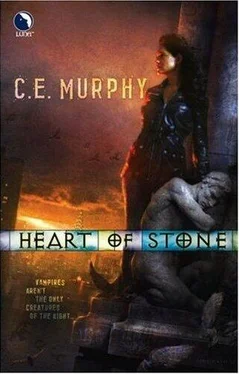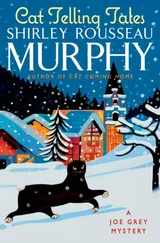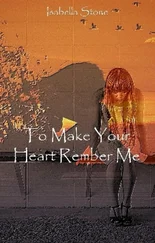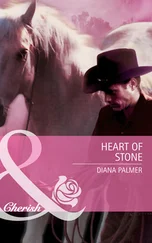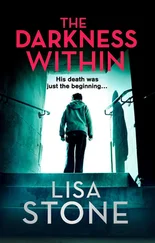“Do you not like people to see your other face?” Margrit asked without thinking.
Surprise creased the scar that ran across Biali’s right eye. “Insightful little bint, aren’t you? What do you want?”
“Tell me what you know about Hajnal.”
Biali came to his feet in a movement that bespoke anger and grace all at once. “Hajnal’s dead. Has been for centuries. Don’t tell me you’re up here crowing your throat dry to be told that. What are you trying to do, lawyer? Call every Old Race in the city to your doorstep? They’re not all as friendly as I am, and Korund’s not here to watch over you.”
Margrit let go of her hair with one hand, strands of it instantly snapping into her face, and pulled the sapphire out of her pocket, letting it rest in her palm. Biali snarled with recognition, pouncing forward to snatch it from her. Margrit flinched back faster than she thought she could move, closing her fingers around the stone.
“You’ve got no right to that,” Biali growled. “It belonged to Hajnal.”
“I’ve got at least as much right to it as Janx,” Margrit said. “That’s who I got it from. Know where he got it?”
The gargoyle dropped into a crouch. “Tell me.”
“He got it from the latest murder scene, Biali. Now, want to try again? Tell me what you know about Hajnal. I don’t think she’s dead.”
Anger reflected in Biali’s eyes. “Where’s she been for two hundred years, if she’s not dead? You want to know what I know? The women who are dying? They all look like her.”
Margrit took a step back, startled. “They do?”
Biali smirked, dropping his chin. “Korund didn’t tell you, did he. Maybe he doesn’t even realize, though I’d think he would. Two centuries alone with nothing but memories of the one he lost. I’d think he’d recognize her anywhere. She was little, not like most of us, and dark, and that’s really not like us.”
“Dark? They’re all white, the women who’ve been killed.”
Biali snorted. “Dark hair, dark eyes. Some color to her skin.” He looked Margrit over, curling a lip. “Less than a darkie like you, but compared to the rest of us she might’ve been black as midnight.” Faint pleasure creased his face when Margrit tightened her fingers around the sapphire, warmth flushing her cheeks as she fought not to rise to the insult. Satisfied with the barb, Biali went on, flicking a broad hand toward his nearly white hair, close in color to Alban’s. “We mostly come in pale, but her family name was Dunstan for a reason.”
Margrit shook her head. “I don’t know what that means.”
“Dark stone.” Biali seemed to get peculiar satisfaction from translating the name, as if it was another jibe at Margrit herself. “Her family bred true, but not often. Hajnal was a rare one. That stone isn’t yours to keep.”
“I’ll give it to Alban,” Margrit said. Biali pushed his lips out, but nodded.
“She’s dead, lawyer. You’re just digging up old graves.”
“But what if she’s not? Could she do something like this?”
“Could a gargoyle rip apart a few human women?” Biali snorted again, sarcastically. “One of our children could kill a mob of unarmed adult humans. If we’d done that a long time ago we might not be so few, and you so many.”
“Is that what you think should have happened?”
Biali studied her, then set his jaw and looked away. “I think your people would’ve outbred us and the war would’ve been lost in time anyway. It wasn’t only Hajnal’s family that bred rarely. Korund’s right, not that I’d say it to his face. There aren’t enough of us. There never have been.”
“Will your people die out?” Margrit let her hair go and wrapped her arms around herself, frowning at the gargoyle as curls whipped her face again.
Biali barked laughter. “We live a long time, lawyer. Maybe when your folk have destroyed themselves, we’ll have a chance to try again. There aren’t many of us, but don’t nail the coffin closed yet.”
“I don’t want to.” Margrit tightened her arms, surprised at her own ferocity. “You think she could do this.”
“Any gargoyle is physically capable of it. But if she were alive, I don’t know why she’d kill women who looked like her. We don’t kill for fun.”
Margrit’s eyebrows rose a little. “I thought you worked for Janx. Beating people up.”
Biali shrugged. “Gotta make a living, lawyer. It’s survival, not entertainment.” He grinned suddenly, toothily. “Can’t say that I don’t enjoy it, though. Kind of a chance to get-” He broke off. Margrit’s chin came up.
“To get back at us for not knowing you even exist,” she guessed. Biali’s scar creased as he grimaced and shifted his gaze away. “I’m not even sure I can blame you,” Margrit said. “You all live in a shadow world, don’t you? You gargoyles especially. The rest of them can at least participate during daylight. You never even see the sun rise.”
“Don’t feel too sorry for us,” Biali spat. “Our world is something you’ll never know.”
“I’ve seen a little bit of it,” Margrit said. “I’m beginning to understand why you do what you do. Why Alban’s made the choices he’s made. I don’t think I’d want to put myself through two hundred years of solitude, but maybe it seemed like there wasn’t anything else.”
“There wasn’t.”
“There’s always something else,” Margrit argued. “There’s always a choice. Maybe not a good one, but there’s always a choice. Alban says your people don’t change their names.”
Biali’s eyebrows drew down. “That’s for dragons and djinns,” he said derisively. “We gargoyles know what we are.”
“But what if you had to make a choice?” Margrit asked. “What if you had to change?”
“I got no idea what you’re talking about, lawyer.”
“My name’s Margrit. Margrit Knight.”
“Knight,” Biali said after a few long moments. Margrit ducked her head, savoring the small triumph. “I got no idea what you’re talking about, Knight.”
“Alban said Ausra means dawn. Just like Hajnal does.”
Wariness came into Biali’s eyes. “So?”
“So I think two hundred years ago, Ausra was Hajnal. And I think you know where she is.”
“I told you before,” Biali grated. “I never heard of Ausra.”
A woman, bedraggled with travel but carrying herself with pride, stepped into Margrit’s line of vision. Her hair was black with rain, the water pulling curls out of shape, and her skin was amber-tinted, translucent. She was lovely, delicate in facial structure and body, but there was a coldness in her dark eyes, an absolute lack of empathy that made Margrit feel uncomfortably like prey. Not until the woman shifted her shoulders, half spreading graceful wings, did she recognize her as a gargoyle.
Shock coursed through Margrit, the crash of her heartbeat suddenly noticeable. It felt wrong, too slow, and at the same time as if it had suddenly leaped to a rabbit’s pace. Then Biali’s rough voice came from within Margrit’s own throat, filled with astonishment. “You’re dead.”
A sharp smile cut the gargoyle woman’s face and she moved, so quickly Margrit flinched, trying to avoid her.
Memory shattered with the movement, leaving her alone on the rooftop facing Biali. Margrit held a hand to her head, blinking from the echoes scraping around in her skull, then lifted her gaze to the gargoyle. Nothing had changed in his sour expression; no hint remained of what had transpired between them. Alban hadn’t known humans were capable of hearing the telepathic link that allowed gargoyles to share their memories. Neither, it seemed, did Biali.
A faint smile curved Margrit’s mouth, telltale admission of having won a round. “You’re lying.” The confidence in her own voice fed on itself and she stepped forward, challenging the blunt-featured gargoyle. “I don’t know if your kind go crazy or not, but-”
Читать дальше
Конец ознакомительного отрывка
Купить книгу
